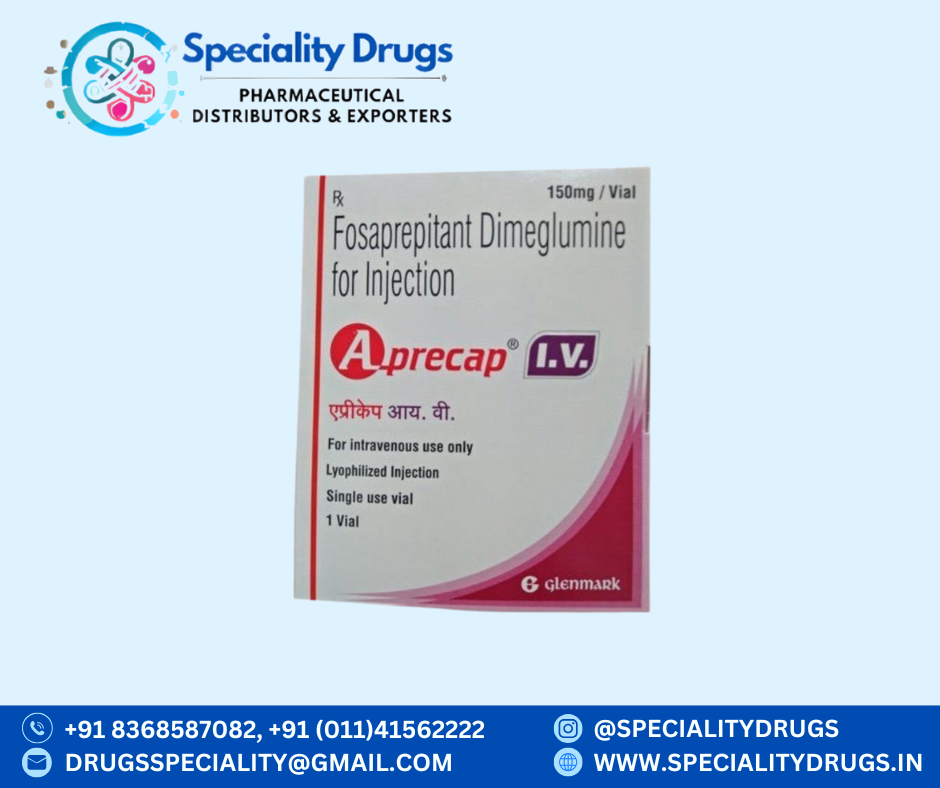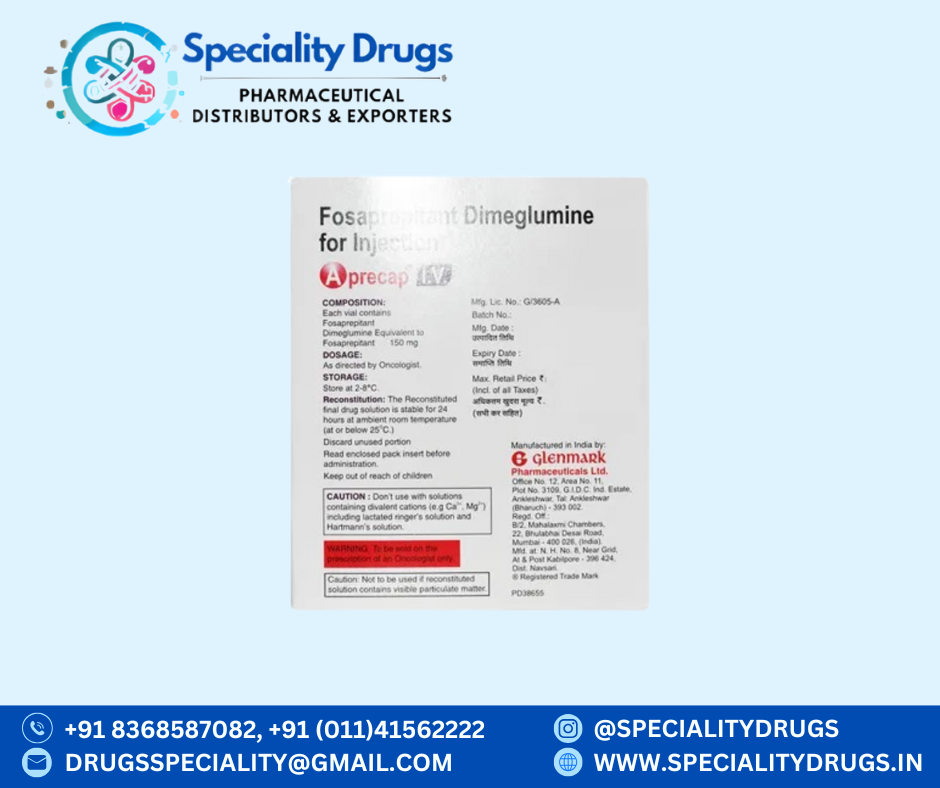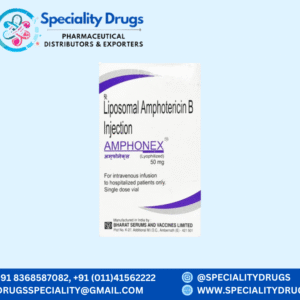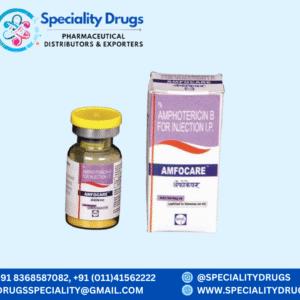APRECAP INJ is an injectable form of Aprepitant, a medication that belongs to a class of drugs known as neurokinin-1 (NK1) receptor antagonists. It is primarily used in hospitals and clinical settings to prevent nausea and vomiting caused by chemotherapy, particularly for highly or moderately emetogenic cancer treatments. APRECAP INJ is typically administered as part of a combination therapy alongside other antiemetics.
What is the use of APRECAP INJ?
APRECAP INJ is used to prevent:
-
Acute and delayed nausea and vomiting associated with initial and repeat courses of highly or moderately emetogenic chemotherapy (e.g., cisplatin-based regimens).
-
Postoperative nausea and vomiting (PONV) in some cases (though this is less common compared to oral formulations).
It is not used to treat nausea or vomiting once it has already started but is given before chemotherapy sessions as a preventive measure.
Benefits of APRECAP INJ
-
Highly effective prevention of both acute (within 24 hours) and delayed (after 24 hours) chemotherapy-induced nausea and vomiting (CINV).
-
Convenient single-dose administration, often given before the start of chemotherapy.
-
Improved quality of life for patients undergoing chemotherapy by reducing discomfort and risk of dehydration and malnutrition due to vomiting.
-
Reduces the need for rescue antiemetics, making treatment more predictable and comfortable.
-
Often used in combination with 5-HT3 antagonists (e.g., ondansetron) and corticosteroids (e.g., dexamethasone) for enhanced effectiveness.
How does APRECAP INJ work?
APRECAP INJ works by blocking the action of neurokinin-1 (NK1), a natural substance in the brain that triggers nausea and vomiting. By inhibiting the binding of substance P to NK1 receptors, Aprepitant prevents the chain of events in the brain that leads to emesis, especially in response to chemotherapy.
Side Effects of APRECAP INJ
Like all medications, APRECAP INJ may cause some side effects. Most are mild and temporary, but it’s important to be aware of them:
Common Side Effects:
-
Fatigue
-
Hiccups
-
Constipation or diarrhea
-
Loss of appetite
-
Headache
Less Common but Serious Side Effects:
-
Allergic reactions (rash, itching, swelling)
-
Dizziness or light-headedness
-
Liver function changes (elevated liver enzymes)
-
Injection site reactions (pain, redness, or swelling)
If you experience any severe or persistent side effects, contact your healthcare provider immediately.
Precautions and Warnings
-
Inform your doctor if you have liver problems, are pregnant, or breastfeeding.
-
APRECAP INJ may interact with other medications such as warfarin, oral contraceptives, or certain antifungals and antibiotics.
-
Should be administered under medical supervision only.
1. What is APRECAP INJ used for?
APRECAP INJ is used to prevent nausea and vomiting caused by chemotherapy, particularly highly or moderately emetogenic regimens.
2. How does APRECAP INJ work?
It works by blocking NK1 receptors in the brain, preventing the action of substance P, a chemical involved in triggering nausea and vomiting.
3. When is APRECAP INJ given?
It is usually administered before chemotherapy as part of a preventive antiemetic regimen.
4. How is APRECAP INJ administered?
It is given as an intravenous injection (IV) by a healthcare professional, usually in a hospital or clinic setting.
5. Can APRECAP INJ be used alone?
No, it is typically used in combination with other antiemetics like ondansetron (a 5-HT3 antagonist) and dexamethasone (a corticosteroid) for best results.
6. Is APRECAP INJ effective for both acute and delayed nausea?
Yes, it helps prevent both acute (within 24 hours) and delayed (after 24 hours) chemotherapy-induced nausea and vomiting.
7. What are the common side effects of APRECAP INJ?
Common side effects include:
-
Fatigue
-
Hiccups
-
Constipation
-
Headache
-
Injection site reactions
8. Are there any serious side effects of APRECAP INJ?
Yes, though rare, serious effects may include:
-
Allergic reactions
-
Elevated liver enzymes
-
Dizziness
-
Severe skin reactions
9. Can pregnant or breastfeeding women use APRECAP INJ?
Use during pregnancy or breastfeeding should be done only if clearly needed and under the advice of a doctor.
10. Does APRECAP INJ interact with other medications?
Yes, it may interact with:
-
Warfarin
-
Oral contraceptives
-
Certain antifungals and antibiotics
Always inform your doctor of any medications you are taking.
11. Is APRECAP INJ safe for children?
Its use in pediatric patients depends on clinical judgment and specific indications. Your doctor will decide based on the child’s condition.
12. Can APRECAP INJ be taken with food or drink?
Since it is an injectable drug given in a clinical setting, food and drink don’t directly impact its administration, but follow your doctor’s dietary instructions.
13. How long does the effect of APRECAP INJ last?
APRECAP INJ helps protect against nausea and vomiting for up to 5 days after chemotherapy, especially when used with other medications.
14. What should I do if I miss a dose of APRECAP INJ?
APRECAP INJ is usually given in a controlled setting by a healthcare provider, so missed doses are rare. Contact your provider if there’s any concern.
15. Can APRECAP INJ be reused for every chemotherapy session?
Yes, it is often repeated before each cycle of chemotherapy, depending on the type of treatment and your doctor’s recommendation.







Reviews
There are no reviews yet.